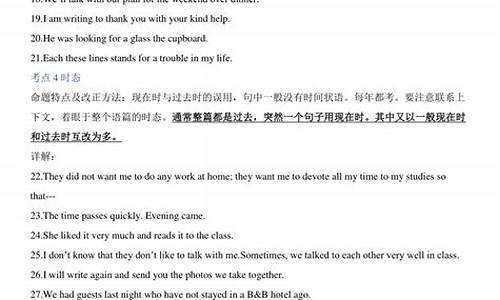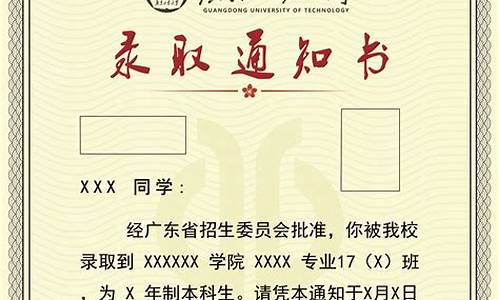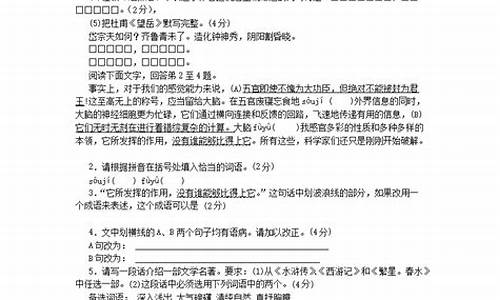您现在的位置是: 首页 > 教育新闻 教育新闻
2017全国卷英语改错_2017高考英语改错题
tamoadmin 2024-06-16 人已围观
简介1.2017年高考英语备考:关系代词副词的区别2.河北英语高考题2017年3.2018年四川高考英语使用全国几卷一是选材丰富多用,渗透中外文化,助力文化品格培养,倡导科技,培育学生的情怀和国际视野,落实立德树人任务,体现学科核心素养的渗透。此次全国卷1高考英语试题的素材选材符合真实性强、时代性强、题材广泛、体裁多样、语篇典型、难度适合的原则。体裁覆盖了记叙文、说明文、议论文和应用文等四大文体。选用
1.2017年高考英语备考:关系代词副词的区别
2.河北英语高考题2017年
3.2018年四川高考英语使用全国几卷

一是选材丰富多用,渗透中外文化,助力文化品格培养,倡导科技,培育学生的情怀和国际视野,落实立德树人任务,体现学科核心素养的渗透。此次全国卷1高考英语试题的素材选材符合真实性强、时代性强、题材广泛、体裁多样、语篇典型、难度适合的原则。体裁覆盖了记叙文、说明文、议论文和应用文等四大文体。选用的语篇材料社会生活、历史文化、科普知识、饮食等,均和学生生活紧密相关。具体话题包括宣传手册(阅读A,介绍Pacific Science Center)、个人情况(阅读B,在野生动物救援和教育组织工作)、艺术与传承(阅读C,爵士乐)、科普知识与技术(阅读D,自制蒸馏器)休闲生活(七选五,露营体验)、学校生活(完形填空,在学校学习美式手语的事情)、饮食与健康(语法填空,在饮食中不能过少或过多摄入脂肪和盐分,两种情况对健康都不好)、难忘经历(短文改错,生日后假期学车时的紧张心情)、传统文化推广(写作,教朋友Leslie学习汉语、唐诗)等话题,具有丰富的人文内涵、现实意义和育人价值。
二是倡导语篇能力,对语言知识运用、阅读理解及写作能力的考查均在语篇层次进行,注重综合运用能力的考核。各部分的任务兼顾真实性、实用性和趣味性,高度考查了学生的运用语言分析和解决问题能力。问题设置力求典型、规范,各部分考点设置分布合理,难度搭配适当,较全面地考查了学生应当掌握的基本语言技能以及各语言技能中包含的具体语言运用能力。命题语言(题目与选项)具有一定的难度,需要学生具有较高的解读(paraphrase)能力,能够反映一直以来高考全国卷的变化趋势。七选五侧重于对学生理解文章结构即文章内容连贯能力的考查,要求学生具有较高的语篇分析能力。
三是写作任务真实。2017高考英语写作是给朋友写信告知下次上课计划,题材是学生平时生活和学习中所熟悉的,又是学习和生活中用得上的,有很强的实用价值;同时具有很强的生活气息,突出了在生活中使用英语传递信息的必要性和真实性,充分体现了用英语做事的教学理念:将来无论在国内大学或者国外深造,导师与学生在很多时候都是采用email联系、交流、布置任务。
语篇材料生词量与阅读量控制得当。2017年全国卷1阅读理解部分的总词量为1894词,文本长度为1436词,与2016年全国卷相比,要求接近(全国卷2007~2016年阅读理解总词量在1800~2000词之间,文本长度在1300~1400之间;其中全国1卷阅读理解长度为1914词,文本长度为1309词)。
完形填空考查学生在篇章层面综合运用背景知识、语言知识和逻辑判断等手段进行意义补全的能力,重点考查实词的用法。要求学生在掌握文章主旨大意和正确理解句与句、段与段之间的内在联系的基础上,准确判断动词、名词、形容词、副词等的意义和作用,语篇层面的考查要点占较大比例。
语法填空考点设置符合考纲要求以及课程标准所倡导的语言学习理念,在语篇层面上考查对语法知识掌握和应用的情况,不仅关注语言基础的词法和句法考查,还重视对语篇逻辑和意义连贯的判断,符合语言真实性的要求。与2016年全国卷1考点相比,此次没有考副词和代词,适当增加了主谓一致和形容词比较级,难度基本持平,答案保持了最大限度的唯一性,信度较高。
短文改错考点设置均为高中阶段学生学习英语过程中常犯的错误类型及项目,考点与考试大纲的样题及近年高考全国卷的考点相一致,对于词法、句法和行文连贯的考查分布合理,重视学生对于语篇的整体理解和逻辑判断。与2016年全国卷1考点相比,适当增加了序数词的考查。
书面表达对于部分写作内容有所限定(如学习内容和课前准备),以保证评分的效度,但对于时间和地点给予了半开放,对学习汉语、唐诗等的意义这些拓展则不作内容规限,保持一定开放性。写作任务对学生运用背景知识,合理拓展写作内容的能力要求比较高,任务能够充分考量学生就话题所表达内容的思想性、合理性和丰富度。
2017年高考英语备考:关系代词副词的区别
高考英语词汇详解:persuade陷阱题解析
persuade是“说服”还是“设法说服”呢?请看题:
I _____ him not to go abroad, but he wouldn’t listen.
A. persuaded B. tried to persuade
C. have persuaded D. was persuaded
陷阱 容易误选A。
分析 正确答案为B。persuade 的真正意思是“说服”,而不是“设法说服”,要表示后者的意思英语应用 try to persuade 。如:
Who persuaded you to join the club? 谁劝说好你参加这个俱乐部的?
The salesman persuaded us to buy his product. 推销员劝说好我们购买他的产品。
I couldn’t persuade him to change his mind. 我没法劝说他改变主意。
The salesman persuaded us to buy his product. 推销员说服我们买了他的产品。
Who persuaded you to join the society? 谁劝说你参加这个协会的?
Try as I would, I could not persuade him to give up the idea. 尽管我努力这样做,我却没能劝说他放弃这个想法。
He tried to persuade him to change his mind. 他设法劝说他改变主意。
I want to persuade her to overseas with me. 我想劝说她跟我到海外去。
类似地:
kill 的意思是“杀死”,不表示“设法杀死”,要表示后者的意思英语用 try to kill。
prevent 的意思是“阻止”,不表示“设法阻止”,要表示后者的意思英语用 try to prevent。
河北英语高考题2017年
一、 关系代词和关系副词的区别
1、关系代词(that, who, whom, whose, which)所代替的先行词是人或物的名词或代词,并在句中充当主语、宾语、定语等成分。
例1. Is he the man who/that wants to see you?(who / that在从句中作主语,指人)
例2. He is the man whom/ that I saw yesterday.(whom / that在从句中作宾语,指人)
例3. They rushed over to help the man whose car had broken down.(whose在句中作定语,指人)
例4. Please pass me the book whose (of which) cover is green.(whose在句中作定语,指物。若指物,它还可以同of which互换)
例5. The package (which / that) you are carrying is about to come unwrapped. 你拿的包快散了。(which / that在句中作carry的宾语,指物)
2、关系副词(when, where, why, that)可代替的先行词是时间、地点或理由的名词,在从句中作状语。关系副词when, where, why的含义相当于"介词+ which"结构,因此常常和"介词+ which"结构交替使用。
例6. Beijing is the place where (in which) I was born.
例7. Is this the reason why (for which) he refused our offer?
例8. His father died the year (that / when / in which) he was born.
例9. He can’t find the place (that / where / in which) he lived forty years ago.
二、 判断用关系代词和关系副词
方法1: 用关系代词,还是关系副词完全取决于从句中的谓语动词。及物动词后面无宾语,就必须要求用关系代词;而不及物动词则要求用关系副词。请改错:
1. This is the mountain village where I visited last year.
2. I will never forget the days when I spent in the countryside.
习惯上总把表地点或时间的名词与关系副词 where, when联系在一起。此两题错在关系词的误用上。句1和句2的where, when都应改为which.。
方法2: 准确判断先行词在定语从句中的成分(主、谓、宾、定、状),根据第一点(区别),也能正确选择出关系代词/关系副词。
例10.This museum is ___ you visited a few days age?
A. where B. that C. on which D. the one
例11. This is the museum ____ the exhibition was held.
A. where B. that C. on which D. the one (答案:例1 D,例2 A)
在例10中,所缺部分为宾语,而where, that, on which都不能起到宾语的作用,只有the one既做了主句的表语,又可做从句的宾语,可以省略关系代词,所以应选D。
而例11中, 主、谓、宾俱全,从句部分为句子的状语表地点,既可用副词where,又因 in the museum词组,可用介词in + which 引导地点状语。而此题中,介词on 用的不对,所以选A。
关系词的选择依据在从句中所做的成分,先行词在从句中做主、定、宾语时,选择关系代词 (who, whom, that, which, whose); 先行词在从句中做状语时,应选择关系副词 ( where 地点状语,when 时间状语,why 原因状语)。
方法3:当先行词是all, everything, anything, nothing,the one, much, few, any, little等,或先行词是形容词级时,或在there be 句型中,或当先行行词既有人又有物时,关系代词用that, 而不用which。
例12. Finally, the thief handed everything that he had stolen to the police.
例13. The soldiers and their guns that we sent to the front were lost.
方法4:在引导非限定性定语从句时,和在介词后不能用that,应用which。
例14.(错) The tree, that (改为which)is four hundred years old, is very famous here.
例15.We depend on the land from which we get our food.
2018年四川高考英语使用全国几卷
许多在眼前看来天大的事,都不是人生一战,而只是人生一站。确实高考备战让你们很辛苦,可是已经坚持了这么久,这就已经是胜利。祝高考成功!下面是我为大家推荐的河北英语高考题2017年,仅供大家参考!
河北英语高考题2017年第I卷
注意事项:
1.答第I卷前,考生务必将自己的姓名、准考证号填写在答题卡上
2.选出每小题答案后,用2B铅笔把答题卡上对应题目的答案标号涂黑。如需改动,用橡皮擦干净后,再选涂其他答案标号。不能答在本试卷上,否则无效
第一部分听力(共两节,满分30分)
做题时,先将答案标在试卷上,录音内容结束后,你将有两分钟的时间将试卷上的答案转涂到答题卡上
第一节(共5小题;每小题1.5分,满分7.5分)
听下面5段对话。每段对话后有一个小题,从题中所给的A、B、C三个选项中选出最佳选项,并标在试卷的相应位置。听完每段对话后,你都有10秒钟的时间来回答有关小题和阅读下一小题题。每段对话仅读一遍。
例:How much is the shirt?
A.£19.15. B.£9.18. C.£9.15.
答案是C。
1. Where is Mary?
A. In the classroom. B. In the library. C. On the playground.
2. How much should the man pay for the tickets?
A. $16. B. $12. C. $6
3. Why can?t the woman give the man some help?
A. She is quite busy now.
B. She doesn?t like grammar.
C. She is poor in grammar,too.
4. What happened to Marx?
A. He lost his way.
B. He found his bike missing.
C. He lost his wallet.
5. Why did the man fail to attend the party?
A. He forgot it.
B. He didn?t know about the party.
C. He wasn?t invited to the party.
第二节(共15小题;每小题1.5分,满分22.5分)
听下面5段对话或独白。每段对话或独白后有几个小题,从题中所给的A、B、C三个选项中选出最佳选项,并标在试卷的相应位置。听每段对话或独白前,你将有时间阅读各个小题,每小题5秒钟;听完后,各小题将给出5秒钟的作答时间。每段对话或独白读两遍。
听第6段材料,回答第6、7题。
6. Why must the man drive to work?
A. It is the quickest way.
B. He has to use his car after work.
C. He lives too far from the subway.
7. What?s the relationship between the speakers?
A. Boss and employee.
B. Grandmother and grandson.
C. Teacher and student.
听第7段材料,回答第8~9题。
8. When is Alice?s birthday?
A. Tomorrow. B. The day after tomorrow. C. Today.
9. What will the two speakers buy for Alice?
A. A recorder. B. Some flowers. C. A box of chocolates.
听第8段材料,回答第10~12题。
10. What does the woman do in the group?
A. Play the piano. B. Play the violin. C. Sing for the group.
11. Who is Miss Pearson?
A. Leader of the group.B. Director of the group. C. Teacher of the group.
12. How often does the group meet?
A. Once a week. B. Twice a week. C. Every third week.
听第9段材料,回答第13~16题。
13. Who possibly is the woman?
A. An air hostess. B. A native Indian. C. A travel agent.
14. How long does the trip last?
A. Seven days. B. Eight days. C. Nine days.
15. What will the man probably do at the second stage?
A. Do some shopping. B. Visit the Taj Mabal. C. See wild animals.
16. What will the speakers do next?
A. Say goodbye to each other.B. Find out the price. C. Go to India by air.
听第10段材料,回答第17~20题。
17. In what way does Jack like to travel?
A. With a lot of people.
B. With one or two good friends.
C. All by himself.
18. What does Helen prefer on holiday?
A. Staying at home.
B. Seeing famous places.
C. Enjoying nature quietly.
19. What does Bob like the best about travel?
A. Making more friends. B. Buying what he wants. C. Seeing and learning.
20. Who prefers to do shopping while traveling?
A. Jack. B. Helen. C. Bob.
第二部分阅读理解(共两节,满分40分)
第一节(共15小题;每小题2分,满分30分)
阅读下列短文,从每题所给的四个选项(A、B、C和D)中,选出最佳选项,并在答题卡上将该项涂黑。
A
We have designed all our bank cards to make your life easier.
Using your NatWest Service Card
As a Switch card, it lets you pay for all sorts of goods and services, whenever you see the Switch logo. The money comes straight out of your account, so you can spend as much as you like as long as you have enough money (or an agreed overdraft (透支) to cover it). It is also a cheque guarantee card for up to the amount shown on the card. And it gives you free access to your money from over 31,000 cash machines across the UK.
Using your NatWest Cash Card
You can use your Cash Card as a Solo card to pay for goods and services wherever you see the Solo logo. It can also give you access to your account and your cash from over 31,000 cash machines nationwide. You can spend or withdraw what you have in your account, or as much as your agreed overdraft limit.
Using your cards abroad
You can also use your Service Card and Cash Card when you?re abroad. You can withdraw cash at cash machines and pay for goods and services wherever you see the Cirrus or Maestro logo displayed.
We take a commission charge (手续费) of 2.25% of each cash withdrawal you make (up to£4) and a commission charge of 75 pence every time you use Maestro to pay for goods or services. We also apply a foreign-exchange transaction fee of 2.65%.
Using your NatWest Credit Card
With your credit card you can do the following:
* Pay for goods and services and enjoy up to 56 days? interest-free credit.
* Pay in over 24 million shops worldwide that display the MasterCard or Visa logos.
* Collect one AIR MILE for every£20 of spending that appears on your statement (结算单). (This does not include foreign currency or traveler?s cheques bought, interest and other charges.)
21. If you carry the Service Card or the Cash Card, ________.
A. you can use it to guarantee things as you wish
B. you can draw your money from cash machines conveniently
C. you can spend as much money as you like without a limit
D. you have to pay some extra money when you pay for services in the UK
22. If you withdraw£200 from a cash machine abroad, you will be charged ________.
A. £4 B. £4.5 C. £5.25 D. £5.3
23. Which of the following is TRUE about using your NatWest Credit Card?
A. You have to pay back with interest within 56 days.
B. You can use the card in any shop across the world.
C. You will be charged some interest beyond two months.
D. You will gain one air mile if you spend £20 on traveller?s cheques.
24. The purpose of the passage is to show you how to ________.
A. pay for goods with your cards B. use your cards abroad
C. draw cash with your cards D. play your cards right
B
Once when I was facing a decision that involved high risk, I went to a friend. He looked at me for a moment, and then wrote a sentence containing the best advice I?ve ever had: Be bold and brave ? and mighty (强大的) forces will come to your aid.
Those words made me see clearly that when I had fallen short in the past, it was seldom because I had tried and failed. It was usually because I had let fear of failure stop me from trying at all. On the other hand, whenever I had plunged into deep water, forced by courage or circumstance, I had always been able to swim until I got my feet on the ground again.
Boldness means a decision to bite off more than you can eat. And there is nothing mysterious about the mighty forces. They are potential powers we possess: energy, skill, sound judgment, creative ideas ? even physical strength greater than most of us realize.
Admittedly, those mighty forces are spiritual ones. But they are more important than physical ones. A college classmate of mine, Tim, was an excellent football player, even though he weighed much less than the average player. ?In one game I suddenly found myself confronting a huge player, who had nothing but me between him and our goal line,? said Tim. ?I was so frightened that I closed my eyes and desperately threw myself at that guy like a bullet ? and stopped him cold.?
Boldness ? a willingness to extend yourself to the extreme?is not one that can be acquired overnight. But it can be taught to children and developed in adults. Confidence builds up. Surely, there will be setbacks (挫折) and disappointments in life; boldness in itself is no guarantee of success. But the person who tries to do something and fails is a lot better off than the person who tries to do nothing and succeeds.
So, always try to live a little bit beyond your abilities?and you?ll find your abilities are greater than you ever dreamed.
25. Why was the author sometimes unable to reach his goal in the past?
A. He faced huge risks. B. He lacked mighty forces.
C. Fear prevented him from trying. D. Failure blocked his way to success.
26. What is the implied meaning of the underlined part?
A. Swallow more than you can digest. B. Act slightly above your abilities.
C. Develop more mysterious powers. D. Learn to make creative decisions.
27. What can be learned from Paragraph 5?
A. Confidence grows more rapidly in adults. B. Trying without success is meaningless.
C. Repeated failure creates a better life. D. Boldness can be gained little by little.
C
The wallet is heading for extinction. As a day-to-day essential, it will die off with the generation who read print newspapers. The kind of shopping-where you hand over notes and count out change in return?now happens only in the most minor of our retail encounters,like buying a bar of chocolate or a pint of milk from a corner shop. At the shops where you spend any real money, that money is increasingly abstracted. And this is more and more true, the higher up the scale you go. At the most cutting-edge retail stores?Victoria Beckham on Dover Street, for instance?you don't go and stand at any kind of cash register when you decide to pay. The staff are equipped with iPads to take your payment while you relax on a sofa.
Which is nothing more or less than excellent service, if you have the money. But across society, the abstraction(抽象) of the idea of cash makes me uneasy. Maybe I'm just old-fashioned. But earning money isn't quick or easy for most of us. Isn't it a bit incredible that spending it should happen in half a blink(眨眼)of an eye? Doesn't a wallet?that time-honoured Friday-night feeling of pleasing, promising fatness?represent something that matters?
But I'll leave the economics to the experts. What bothers me about the death of the wallet is the change it represents in our physical environment. Everything about the look and feel of a wallet?the way the fastenings and materials wear and tear and loosen with age, the plastic and paper and gold and silver, and handwritten phone numbers and printed cinema tickets?is the very opposite of what our world is becoming. The opposite of a wallet is a smartphone or an iPad. The rounded edges, cool glass, smooth and unknowable as pebble(鹅卵石). Instead of digging through pieces of paper and peering into corners, we move our fingers left and right. No more counting out coins. Show your wallet, if you still have one. It may not be here much longer.
28. What is happening to the wallet?
A. It is disappearing. B. It is being fattened.
C. It is becoming costly. D. It is changing in style.
29. What makes the author feel uncomfortable nowadays?
A. Saving money is becoming a thing of the past.
B. The pleasing Friday-night feeling is fading.
C. Earning money is getting more difficult.
D. Spending money is so fast and easy.
30. Why does the author choose to write about what's happening to the wallet?
A. It represents a change in the modern world.
B. It has something to do with everybody's life.
C. It marks the end of a time-honoured tradition.
D. It is the concern of contemporary economists.
31. What can we infer from the passage about the author?
A. He is resistant to social changes.
B. He is against technological progress.
C. He feels reluctant to part with the traditional wallet.
D. He feels insecure in the ever-changing modern world.
2018年四川高考英语使用什么试卷,用的是全国卷还是自主命题?在复习备考过程中,考生们一定要弄清楚高考考的是什么卷子,这样在复习时也能做到心中有数。下面是2018年四川高考英语使用哪套试卷。
四川英语2018年用什么试卷
2018年四川高考英语试卷使用全国Ⅲ卷,新课标三卷,也就是全国丙卷。通常情况下,全国丙卷会比全国乙卷和甲卷简单一些,但考全国卷的省份都会根据考试大纲命题,不会因地区或教材等因素而区别对待考生。
高考试卷一般会密封存档,高考结束后不允许带出考场,考生们答题时一定要确保把答题卡填涂完整,千万不要答窜题,试卷和草稿纸可以随意写写画画。
推荐阅读: 2018年全国各省市高考使用全国几卷
四川高考去年英语试卷难度分析
命题特点
2017年高考全国丙卷英语试题,在内容上体现了新课程理念,贴近中学英语教学,坚持对基础知识、基本技能以及思想方法的考查。在命题素材选择上体现课程标准中的情感态度、情感体验和文化意识等,体现语言测试的教育功能。试卷体现了“稳定与创新”的命题原则,以稳为主,稳中求进。可以概括为:遵守考纲平稳创新;梯度适当区分合理;注重基础兼顾能力;培植探究彰显素养;贴近生活落实交际。
具体特点如下:
1. 体现新课标理念,难度相对稳定。试卷紧扣考试大纲,合理地完成了对基本知识和基本能力的考查。对传统内容的考查在保持平稳的基础上进行了适度创新。
2. 充分体现测试功能、教育功能、交际功能和价值功能,试题设计科学。整套试卷遵循“突出语篇,强调应用,注重交际”的命题原则。
3. 素材贴近生活,紧跟时代潮流。命题素材体现了“与时俱进、与时俱新、与时俱行”的命题原则,体现“突出语篇,强调运用,重在交流”的命题导向,有利于引导学生积累文化生活知识以及人文和科学素养。命题体裁多元化,包括记叙文、说明文、应用文等,而且话题涉及面广,介绍了旅游、科技、睡眠健康、学生生活等。
4. 弘扬传统文化,具有教育意义。选材体现了科学精神和人文素养的熏陶教育以及核心素养的统一。命题素材不但介绍异域文化,而且宣传和弘扬中国传统文化。
命题趋势
1. 听力:听力仍然围绕考生熟悉的生活、学习、购物、就餐、住宿、旅游等日常生活话题,运用简短对话和独白考查学生对主旨大意的归纳、事实细节的捕获以及推理判断等能力。
2. 阅读理解:从体裁和难度上看:应用文最简单,科技文难度适中;题材方面:题材仍然体现了来源于实际生活、紧贴时代、反映英美文化、感悟人生价值、弘扬正能量、培养核心素养体系等特点;从题型上来看,细节理解题占多数,推理判断题其次,然后是主旨大意题和词义猜测题。
3. 完型填空:完形填空仍然是记叙文,难度稍低。设空以实词为主,其中动词和动词短语8个,名词8个,形容词和副词共4个,而没有涉及到连词和代词的考查。话题与生活联系紧密,符合大众思维,易于学生理解。个别题设置巧妙,较好地体现了区分度。
4. 语法填空和短文改错:仍然在语篇基础上侧重对语法知识的考查,考查点包括:动词时态、语态、形容词、代词、冠词、介词、连词等。
5. 英语书面表达: 2016年书面表达是写一封电子邮件,向朋友道歉;2017年是乒乓球队招队员,请给外籍朋友Eric写信邀请他参加,提示只有两点,1,邀请参加。2,截止时间。由于提示较少,学生的发挥余地很大,区分度也大。









